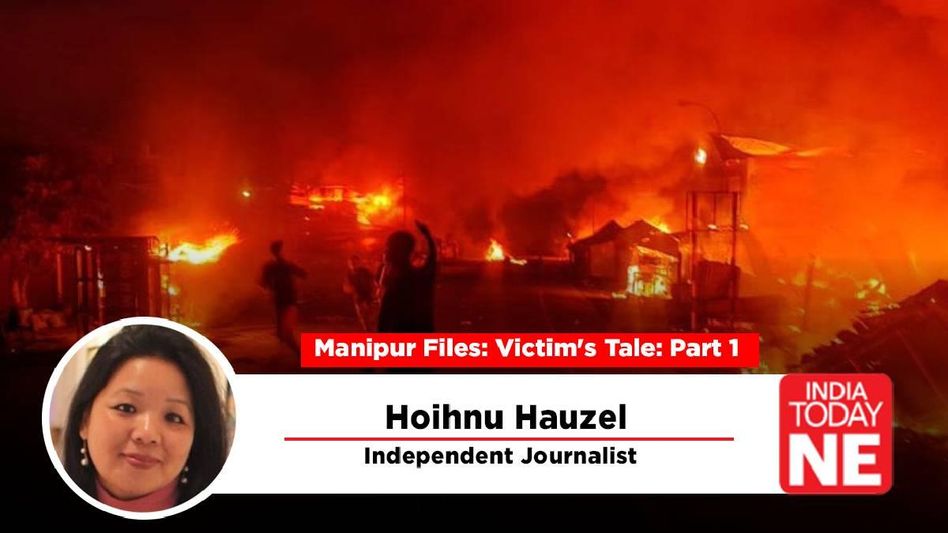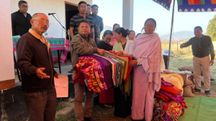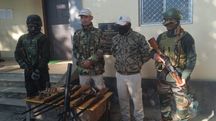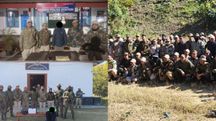
The air was filled with shouts of ‘Kuki hat lo, mei tha se loina'
Rosie is a native of Churachandpur who made Paite Veng her home after she married one of the colony's most eligible bachelors over two decades ago.
 The air was filled with shouts of ‘Kuki hat lo, mei tha se loina'
The air was filled with shouts of ‘Kuki hat lo, mei tha se loina'May 3rd was like any other day in Imphal, breezy and pleasant. The air was cool despite a slight rise in temperature. Rosie Haokip was enjoying the coolness and pottering around her house, a one-storied building dotted with seasonal flowers and greens. Her garden was often a visual treat. It was one of the most prominent houses in Paite Veng, Kwakeithel, a colony inhabited by the very progressive Zomi community of Imphal. That particular morning, which stretched into the afternoon, she was busy overseeing the construction work ongoing on the ground floor of her house.
“Before I turned 60, I thought I must plan to generate some income. So, after taking a loan, I was getting a commercial space built for renting out,” she recalls, looking back on that day.
Rosie is a native of Churachandpur who made Paite Veng her home after she married one of the colony's most eligible bachelors over two decades ago. A talented musician, she was immediately loved and embraced by the community from the day she moved in there as a newly married woman. Soon, she became an active member of the Church where she often presented songs on different occasions. Just two days ago, on May 1, the family, her in-laws, and five children had erected a tombstone for her husband on his fourth death anniversary.

And so, along with overseeing the construction work, she had many other chores to be done. By afternoon, she was lazing around with her children, browsing through old photographs of her late husband. They were reminiscing about their times together. “Strangely, that day, my thoughts just went to my husband, and I thought of how life would have been had he been around today,” she says. In the evening, during tea, the family once again congregated around and fondly spoke of people's love for them, many of whom had attended the death anniversary function two days ago.
Rosie is an educationist. She taught in schools in Himachal Pradesh and Delhi for more than a decade before she moved back to Manipur to be with her aging in-laws.
As the day turned into evening, suddenly the air turned foul. She looked out of her balcony to inspect the noise she heard. “I saw a crowd and police, and I thought it might be just another incident that we have grown accustomed to over the years,” she says. When the noise increased, she got a little worried and called out to her neighbors who lived in the first house of the colony. “I had heard that the ground floor of a KBC Centre church in New Lambuland (a tribal colony in Imphal) was burnt down in the day, so I began to panic,” she says. “My mind was not at rest. I asked my neighbor to look around. She confirmed that there were indeed police personnel present.”
The family had no inkling that the situation would worsen. Just as they were seated for dinner, the noise grew louder. Anticipating major problems, Rosie collected some cash and a few important things in a bag. She even asked her children to pack their educational certificates. Soon after, the mob started pelting stones, breaking the window panes one by one.
“As we were eating, stones were pelted. I ran towards my parents-in-law (my mother-in-law is diabetic and bedridden) who were resting in another room and waiting for dinner. My children were in the kitchen. We never knew we had to run, but my eldest daughter called from Delhi and asked us to flee.”
“We thought we would be able to return home so we did not take anything with us,” says Rosie.
Once the mob ran out of stones, Rosie had the time to leave their house quietly. They climbed the roof of their garage and jumped to their neighbor’s compound. Her mother-in-law was carried by her son. As soon as they got into their neighbor's house, the mother-in-law, who had not eaten anything, was made to lie down on the sofa. And when they looked out of the neighbor’s windows, they saw their house engulfed in flames. One of the six LPG cylinders in the house had exploded, leading to cheers and laughter in the mob outside. Soon, the neighbor’s tin-roof open garage caught fire. The mob started to look for Rosie and her family. Realizing that their lives were in danger, they decided to move out of the neighbor’s house. “My son lifted me over the fence and asked me to wait. Meanwhile, another gas cylinder burst,” recalls Rosie.
The air was filled with shouts of ‘Kuki hat lo, mei tha se loina’ (Kill the Kukis, let’s burn all their homes). Rosie got so nervous and jumped a wall, which was about 7 ft, to go to another neighbor’s compound. That’s when she realized she had fractured her leg. That second house was empty as the owners had already escaped. They huddled near a staircase. A young lady was still hiding in that house, and she called them up to the second floor. “We put my mother-in-law on the sofa once again. By then, she was already exhausted and famished,” recalls Rosie. Meanwhile, her feet started to swell, and her body was burning with fever. “I realized I could not even walk,” she says.
The noise outside was louder than ever. By now, they were watching their house go up in flames. Luckily, they had brought their dog along too. The dog, which was popularly known as the noisiest dog, did not bark even once during the entire evening.
My dad-in-law managed to carry his medicine, and there was Crocin and our house pata. We watched our house burn. We saw our house engulfed in flames. The lady who was in that house gave them water and biscuits. Their phones were kept silent.
As they hid in the house, the mob came and shook the gate. “That was the most terrifying moment,” she recalls. The mob of five-six people started throwing stones and shouting. Rosie’s children saw that the men were drinking all the time. “We were praying really hard and at the same time scared that the dog would bark. But he didn’t,” Rosie sighs.
After the mob left, Rosie called up people she knew, but nobody was in a position to help. Finally, help arrived when a relative could make an appeal to the Army. “My son carried me all the way, and another son carried my mother-in-law. But we had to leave behind our dog,” says Rosie, holding back the torrent of tears.
The next day, they saw a photograph of their burnt house and their husky, Cookie, waiting for them.
After eight days in a relief camp run by the Indian Army, the family who fled home with just the clothes they wore flew off to another state for safety. I asked them, "Where is home?"
“I am reeling under shock. I do not know where we would go. My home is destroyed. But my home is made up of memories, and I carry those memories in my heart. My home is in my heart,” says Rosie.
(Next series will be an account from a Meitei who fled the Hills)
Copyright©2026 Living Media India Limited. For reprint rights: Syndications Today









